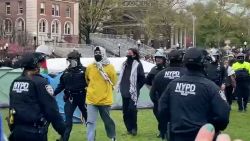Editor’s Note: Areva Martin is a CNN legal analyst and a civil rights attorney. The opinions expressed in this commentary are solely her own. View more opinion on CNN.
As Americans digest the guilty verdicts in the case of the three men charged with murdering Ahmaud Arbery, we can look to the powerful video evidence and the stellar work of prosecutor Linda Dunikoski and her team in managing that evidence as significant factors in an outcome 180 degrees different from the verdict in George Zimmerman’s killing of Trayvon Martin.

The prosecution’s presentation of the evidence and surgically precise cross-examination of Travis McMichael, the shooter, on the stand, left in shreds the preposterous citizen’s arrest/self-defense contentions that were raised. The jury clearly saw these efforts as what they were: a desperate attempt at trial to paint the three defendants as sympathetic, as acting on the belief they were imbued with the authority, privilege and power of law enforcement.
Even if the jurors had bought into the citizen’s arrest narrative, Travis McMichael’s contradictory statements and testimony, along with the video evidence, demonstrated that he never had a fear of imminent harm and never even told Arbery he was holding him for the police. He never mentioned in his statements or otherwise demonstrated a true fear that Arbery would somehow use McMichael’s own weapons, his gun or his truck, to harm any of the three defendants.
Reasonable fear did not motivate this killing. The prosecution had only to mention the elder McMichael’s own words on the 911 call he made. What emergency did he cite? “There’s a Black male running down the street.” By playing those words, the prosecutor gave the jurors a clear picture of what was in the defendants’ minds.
It is White privilege on steroids that these three defendants thought they had a right to stop, detain and ultimately kill a man, when they could have taken many other actions along the way. They could have waited for the police to arrive or followed at a distance without confronting Arbery; instead, they hunted him down, blocked him in and brandished a shotgun.
The prosecutor painted a clear picture of it all, and the jurors saw it in the fullest detail. And in a historical moment in which 11 White jurors and a single Black juror – a cohort drawn from a county where nearly 27% of the population is Black – affirmed that Black lives matter, the verdicts hopefully send a message to would-be vigilantes and everyone else that you cannot usurp the authority of law enforcement and think you won’t be held accountable.
Get our free weekly newsletter
Historic as it may be, this verdict won’t transform our criminal justice system or our nation. The murder convictions of Travis and Gregory McMichael and William Bryan are the outcome of one case in one jurisdiction.
We should not fool ourselves that, overnight, our system has been altered or reformed. This case showed the system can work, not that it does work, because too often, it doesn’t.
Even as this jury rendered their just verdicts, this country is contending with the reality that the George Floyd Justice in Policing Act was blocked by the Senate, that restrictive voting laws have been and are being enacted across the country and gerrymandered maps are stripping voters of their power. We are reminded, daily, that the fight for justice never ends.





















